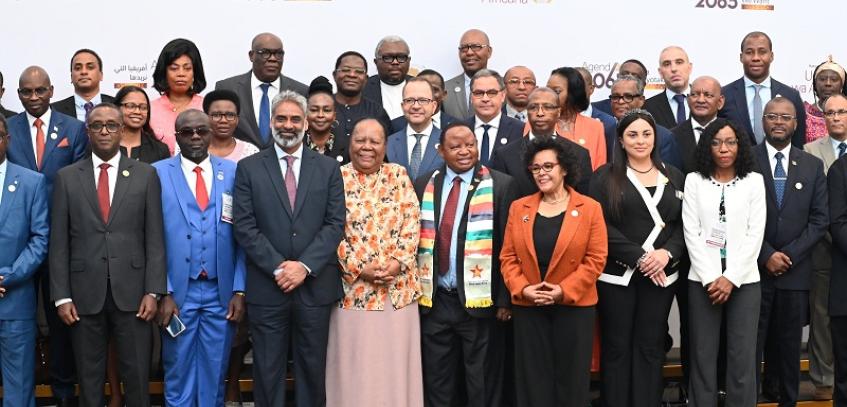The Pan-African Parliament, the legislative arm of the African Union (AU), is taking part in the Retreat of the Executive Council convened to review the status of implementation of the First Ten Year Implementation Plan (FTYIP), and formulate the second decade of Agenda 2063. The three-day meeting (1st – 3rd October 2023) is being held in Kigali, Rwanda, under the theme: “Accelerating Agenda 2063 Implementation”. Agenda 2063, which is the Continent’s blueprint for transforming Africa, was adopted by the 24th Session of the AU Assembly of Heads of State and Government in Addis Ababa in January 2015.
The meeting has so far deduced that the first decade was confronted with various external shocks and disasters triggering the need to put in place an appropriate resilience mechanism for the second decade. Given this context, the Ministerial consultation in Kigali is set to provide guidance on the way forward, drawing on valuable lessons learned from the first decade of Agenda 2063. Reflections are also being made on priority flagship projects that will have a greater impact on integration and accelerate the implementation of Africa’s strategic framework for socio-economic transformation. The meeting is further expected to come up with mechanisms and approaches for the financing of the second-decade implementation plan of Agenda 2063.
The Honourable. Dr. Ashebiri Gayo is leading the Pan-African Parliament delegation to this Ministerial Retreat in Kigali. In his address to the meeting, he called for the implementation of Agenda 2063 to be consistent with the priorities of the African citizenry. He further highlighted the necessity to finance the continent’s development agenda through domestic resource mobilization: “It is imperative to find innovative ways to mobilize resources on the continent to finance our own programmes. This will guarantee ownership of our agenda and deliver full benefits to our citizens. External factors such as the Covid-19 pandemic and the conflict in Ukraine, that impacted the implementation of the first decade of Agenda 2063, have shown that funding our own development project is critical. The Pan-African Parliament stands ready to support initiatives in this regard.”
He continued: “Domestication of Agenda 2063 should be championed by the Pan-African Parliament given our mandate and access to both National and Regional Parliaments and other platforms that encourage citizen engagement and mobilization.”
Pursuant to Article 3.1 of the Protocol to the Treaty establishing the African Economic Community relating to the Pan-African Parliament, the legislative arm of the Union is called upon to “facilitate the effective implementation of the policies and objectives of the African Union”. The Parliament is further expected to promote the ratification, domestication, and popularisation of the African Union instruments.
The Continental Parliament has been earmarked as critical in accelerating the implementation of Agenda 2063, especially given the African Union’s resolve to fully evolve into a people-centered institution, a sine a qua non for achieving its goals.
The Pan-African Parliament delegation to Kigali is comprised of the Clerk of Parliament, Ms. Lindiwe Khumalo and other staff of the Secretariat. As a follow-up meeting to the ongoing Retreat, the Clerk of Parliament is expected to join other African Union Directors for the Medium-Term Plan (MTP) covering the period 2024-2028.
Agenda 2063 embodies the aspirations of the African people, framed in a collective ambition thus: “The Africa We Want in 2063”. The Agenda is operationalized through 5 ten-year implementation plans, with the first plan straddling 2014 to 2023. The Kigali Retreat is bringing together the ministers in charge of Foreign Affairs; ministers in charge of Finance and Development Planning; PRC Members (Ambassadors); AUC leadership; Heads of AU organs; CEO of RECS; Thematic Department / Flagship Projects; Technical Working Group (TWG) on Agenda 2063 and relevant stakeholders in the private sector and civil society.








